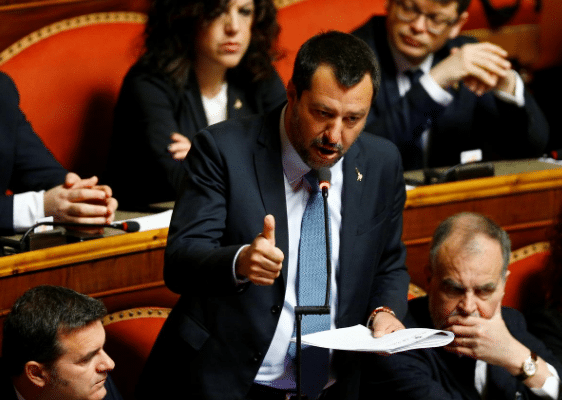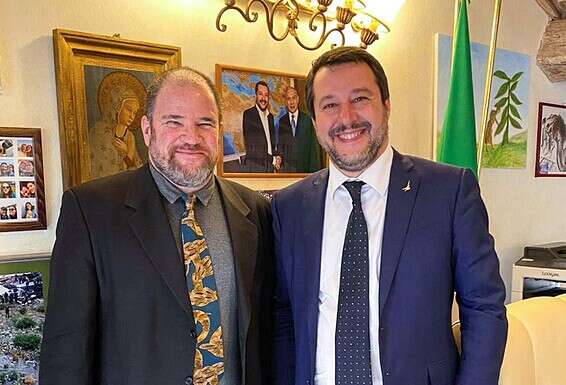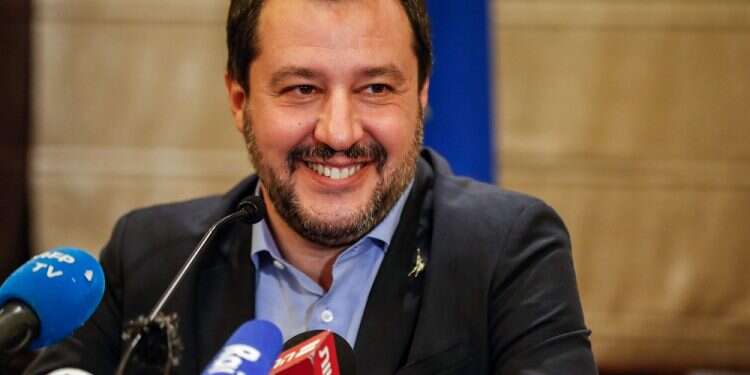These are tumultuous days for Matteo Salvini, head of Italy's right–wing Lega party. Recent polls have projected that were elections in Italy held at this time, he would be elected as prime minister, but his political opponents are trying to strip him of his immunity so they can bring charges against him for alleged misconduct when he was interior minister.
Since coming onto the political scene six years ago, Salvini has transformed Lega Nord per l'Indipendenza della Padania, better known as Lega, from a fringe movement into Italy's largest right-wing party.
Follow Israel Hayom on Facebook and Twitter
Dubbed by Italian media as "the face of anti-immigration politics," Salvini entered the government in 2018 only to resign abruptly in the summer of 2019 after clashing with his coalition partner – the Five Star Movement. Named deputy prime minister and interior minister, Salvini worked to effectively stop mass illegal immigration from Africa to Italy but was hindered by the constant sandbagging of his efforts.
Salvini's Lega party, which is very critical of the European Union, is currently besting all other political parties in nationwide polls, with an impressive 34% approval rate among voters. Now an opposition member, he is sparing no effort to take two counties where voters are die-hard left-wing supporters, as a historic political upset there could herald a change in Italian politics across the board.
Political persecution
Fearing Salvini's victory, his political rivals are using the judiciary against him, in a bid to strip him of his parliamentary immunity so he can face trial for the fact that, in August 2018, as interior minister, he blocked a ship with 150 migrants aboard for almost a week off the coast of Sicily before finally letting it dock after Albania, Ireland and Italy's Catholic Church agreed to house them.
Magistrates subsequently put him under investigation for abuse of power and asked parliament to strip him of his immunity from prosecution, but in March 2019, the Italian Senate denied the request and said he had been acting in Italy's national interest.
Salvini's party, however, is also under investigation for allegedly receiving funding from Russian sources, an accusation Lega denies.

In an exclusive interview with Israel Hayom, Salvini talks about political persecution and compares his situation to that of US President Donald Trump and Prime Minister Benjamin Netanyahu, who are both facing similar woes.
"I defended my country's borders, security, and dignity, and I am proud of that. Unfortunately, when the Left, in the US like in Israel and Italy, loses elections, it seeks revenge in the courts. But they will not succeed," Salvini said.
In the height of this crucial important election campaign, Salvini made time to hold a debate in the Italian Senate on the new type of anti–Semitism – the one hiding behind anti–Israel sentiments.
The conference, attended by Israeli Ambassador to Italy Dr. Dror Eder and President of the Jerusalem Center for Public Affairs Dr. Dore Gold, contributed to the public pressure on the Italian government to adopt the International Holocaust Remembrance Alliance's definition of anti–Semitism
The move is important to "end the hypocrisy of the left-wing parties, which speak of the boycott of Israel and support a Palestinian state, Iran, and Venezuela," he explained.
This will further help these parties clarify their position on the anti–Israel Boycott, Divestment and Sanctions movement, he added, saying that while some parties are willing to fight for the inception of a Palestinian state, they deny the Jewish right of self–determination.
This contradiction is based on hypocrisy, he said, criticizing Italy for being "too slow" in adopting this international definition.

Q: 75 years after the liberation of Auschwitz, why are we again experiencing a surge in anti–Semitism in Europe?
"I think that it has to do with the strengthening of Islamic extremism and fanatism in the last years. Most importantly it is connected to the fact that some academics and media are mobilized against Israel and they create hate of Israel to justify anti–Semitism. There is, of course, anti–Semitism of small political minority groups – Nazis and communists. But, now the massive presence in Europe of migrants coming from Muslim countries, among whom are many fanatics who are getting the full support of certain intellectuals, is spreading anti–Semitism, in Italy as well."
Q: But we are being told that this anti–Semitism is connected to the rise of new right-wing parties in Europe.
"There is far–right anti–Semitism, and there is a far–left anti–Semitism, that is institutionalized. Think of [UK Labour Leader] Jeremy Corbin, or the left activists in Germany, who didn't want to be like the Nazis and ended up boycotting Israeli products. I am sure, however, that the high number of Muslims in Europe is the main cause for the current anti–Semitism."
Q: You are being accused of having contacts with political organizations that are anti–Semitic. What is your reaction to this accusation?
"We [Lega] have no relations whatsoever with such organizations. In the elections, parties like Forza Nuova, CasaPound, Fiamma are running against us. So there are no contacts with them. Those who believe in Neo–Nazi and Neo–fascist anti–Semitism are our enemies as those who believe in the anti–Semitism of the radical left and radical Islam. It's an obligation to fight all those, who claim that the Jews are the Nazis of our time.
Q: Why is it important to you that Italy adopts the international definition of anti–Semitism?
"To put an end to the hypocrisy of the left-wing parties, which are talking about boycotting Israel. Now, among the parties sitting in the government, there is a support for the state of Palestine, for Venezuela and Iran. The definition is going to clarify their positions, like the one regarding the issue of BDS. There are those who fight for Palestinians statehood but deny self–determination for the Jews. This contradiction is based on hypocrisy. Italy has been too slow in adopting this international definition."
Q: You said that the hate for Israel is a dangerous crime. How can we bring the EU to understand that and fight against it?
"We should start working on it in the schools, among the youth. I spent nine years at the European Parliament and I can say that the European institutions – let alone the institutions the UN – are no friends of Israel. The European Parliament has today a majority that is not friendly to Israel. So, I believe we shouldn't focus on these institutions but rather on the new generations. Those who want to erase the State of Israel should know that they will have in us an enemy. Israel is an ally. This should be taught in schools and universities.
Q: Do you regret leaving the government?
"No, I would have done it again. I am sorry about one thing – that the current government is trying to dismantle our reforms on taxes, pensions, and immigration that were useful for Italy. But we will pass then again."
Q: When you will become PM, will Italy recognize Jerusalem as Israel's capital?
"Yes. Absolutely."
Q: Should the EU ban the BDS for being an anti-Semitic movement?
"Yes."
Q: Should the EU join the US in issuing harsh sanctions on Iran and supporting an Iranian revolt against the Islamic regime?
"Yes. To do so we would need a strong and free Europe because nowadays we are unfortunately hostage of economic interests and leftist prejudices that is anti–US and anti–Israel."




